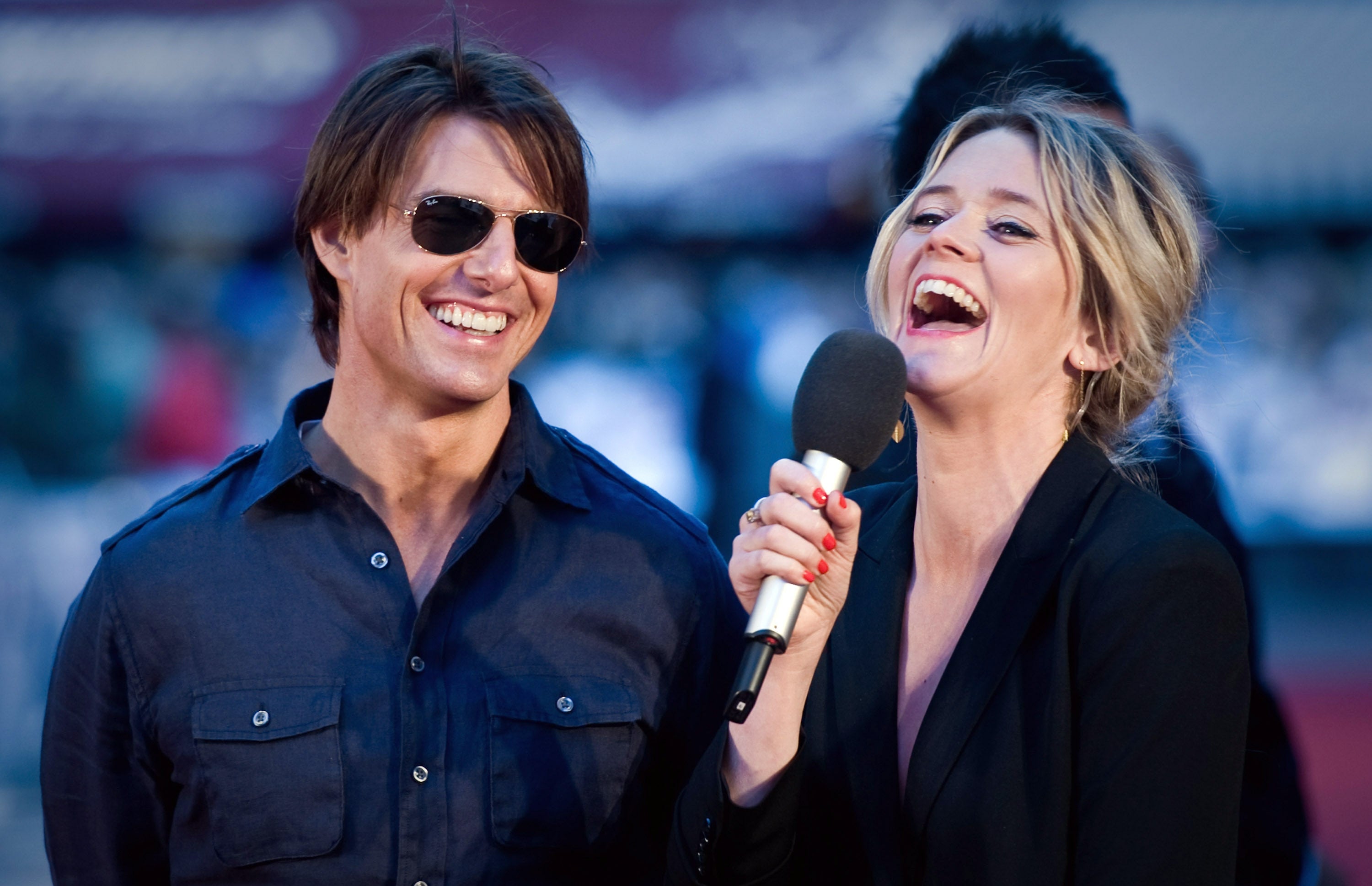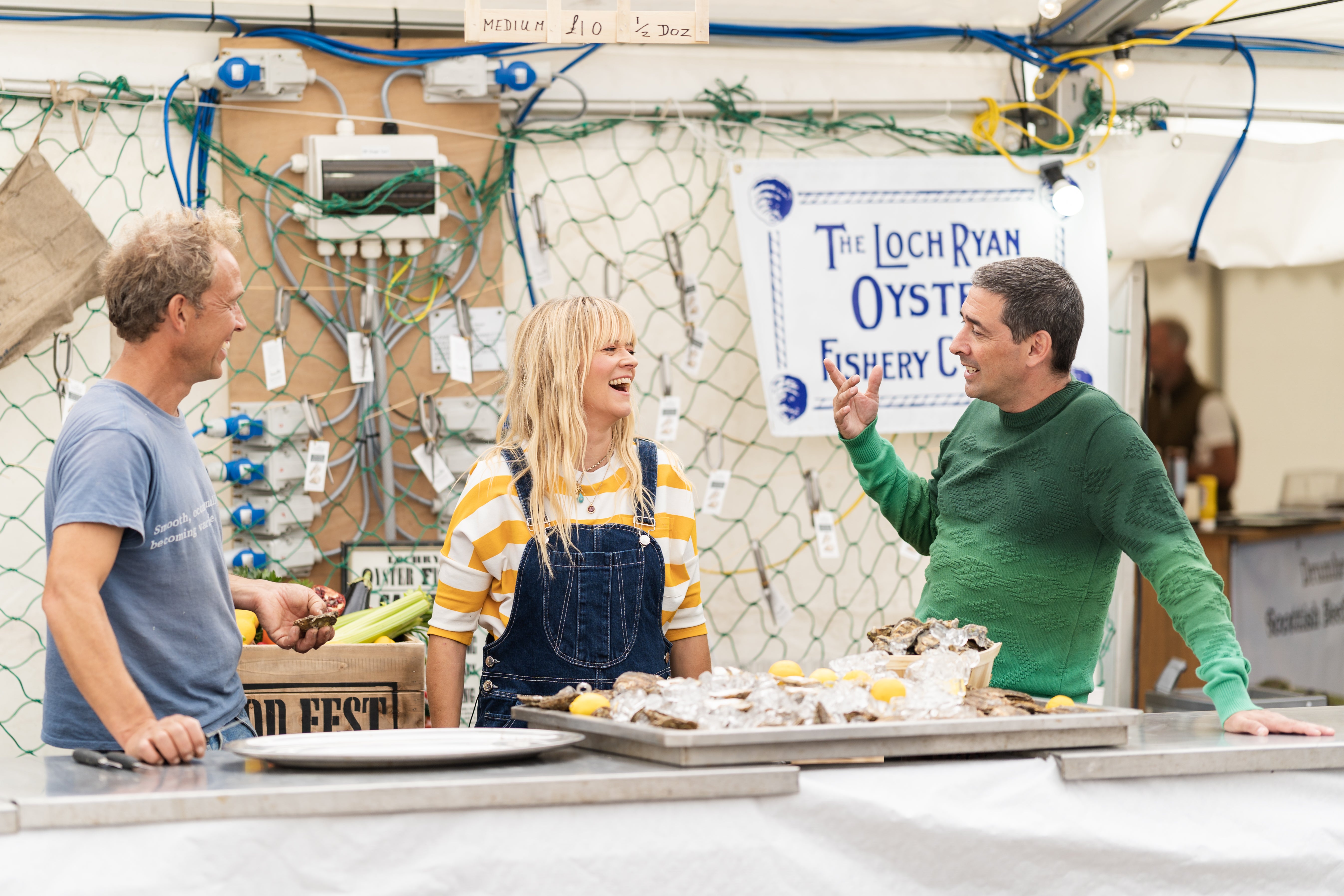
For a young Edith Bowman, growing up in a small seaside hotel in the tiny resort town of Anstruther, 50 miles around the coast up from Edinburgh, was idyllic but cramped. She wouldn’t have had it any other way. Bowman’s family ran The Craw’s Nest, which also had a restaurant that focused on serving fresh fish and produce from local fishermen and farmers. The radio DJ recalls growing up on a diet of “the freshest fish, the freshest food” available – so much so that her uncle, who owned a fishing boat, would “literally fly past our house and chuck a couple of live lobsters on the front door”.
For her new BBC Two series Coast to Coast Food Festival, Bowman, along with co-hosts Colin Murray and Sean Fletcher, travelled around the UK to speak to farmers, producers and community champions about their food stories. The programme also takes Bowman back to Anstruther, giving her the opportunity to reflect on her childhood there and what it has taught her about food. The show is her first professional foray into the world of food.
“The whole essence of what this show is about was my environment growing up,” she tells me, when we meet for a cup of tea at a café near Oxford Circus. It’s in the building that used to house the studios where many of the BBC’s radio shows were made, and Bowman is nostalgic about it; animated as she points out where they used to record. She’s wearing a large beanie that falls over her eyes and an oversized jumper that seems to emphasise her diminutive frame. Greeting me with a firm hug, she immediately starts to chat, her mellow Fife brogue filling the space between us.
Local produce features heavily in her memories; from the big red lorry that would visit the hotel once a week, filled with fruit and vegetables from local farms, to the menu spotlighting whatever seafood – haddock, sole, crabs, prawns – had just been caught off the coast from them recently. It was also important for her parents to buy locally because it was cheaper than importing ingredients from further afield.
Her formative years may have revolved around local gastronomy, but Bowman confesses that its importance didn’t occur to her until she moved away. She went to Queen Margaret University in Edinburgh to study media and communications and had to shop for herself for the first time. “I think it was only when I started buying food for myself that I began noticing on the packets where it’s from,” she recalls. “It wasn’t something I was really aware of before because it wasn’t an important conversation to have at the time. I think there’s also a kind of narrative that has developed where it’s like, if you want good food, it’s got to come from somewhere else. But Italian food here can be just as good as it is in Italy – just look at what Stanley Tucci makes!” (The American actor has made two series on the joys of Italian food, taking multiple trips to Italy and one to London.)
It’s hard to surprise Bowman nowadays. At the age of 49, she has worked solidly for the past two decades and has seen it all. Starting her career as a VJ (video jockey) for MTV, Bowman went on to join BBC Radio 1 in 2003 to co-host the Colin and Edith show with Murray, and later flew solo as she hosted her own weekday afternoon show. Her voice, larger than life and proudly Scottish, filled houses and cars as thousands tuned in to listen to her energetic playlists and insightful interviews.
But in 2009, after five years on Radio 1, Bowman was moved to a quieter slot on a weekend breakfast show, a decision she has previously said “floored” her. Last year, she told Psychologies magazine that she felt “incredibly let down” by the broadcaster and that she “knew I was being edged out by Radio 1”. Bowman says she did get closure about what happened but spoke about it anyway because “I wanted people to get a sense of the reality of a job in this industry”. “With the way social media works, everything’s through rose-tinted glasses. But there are moments where you’re absolutely devastated, and you can’t do anything about it.”
Recently, the BBC was embroiled in controversy over its treatment of Ken Bruce, another major Scottish voice on the radio waves. Bruce hosted his weekday morning show on Radio 2 for a total of 35 years, until January 2023 when he announced he was leaving to host a new show on Greatest Hits Radio. He told his Twitter followers that he was asked to “leave earlier” and his last show was aired on Friday 3 March. “It’s a loss for Radio 2, because Bruce’s listeners are incredibly loyal and he has a great passion for music,” Bowman says. “He’ll take a lot of listeners with him, but that’s healthy for Radio 2 – competition is good. It’ll make them think about how and what they’re doing, and there will be regeneration. Out with the old, in with the new.”

Bowman’s “keep calm and carry on” approach to her work can be attributed to her mother, who has a favourite phrase: “What’s meant for you won’t pass you by.” Bowman says it’s a good one to live by. It’s seen her through tumultuous times in her career, and led to some amazing moments. She’s spoken to some of the biggest names in music and film, from Christopher Nolan and Greta Gerwig to Lewis Capaldi and Bruce Springsteen. Even her husband Tom Smith is famous – he’s the frontman of post-punk indie rockers Editors. As a child, she met the most famous person in the world: the late Queen Elizabeth II, who visited her parent’s hotel for lunch (Anstruther is two hours’ drive from Balmoral). While Bowman is not a royalist herself, her family were big fans. She told The Times that her grandfather had a custom velvet toilet seat made just in case Her Majesty wished to use the facilities.
Given the influence of her family, perhaps it’s no surprise then that Bowman hosts the official podcast for Netflix’s wildly popular series The Crown. She insists she is only interested in the production aspect of The Crown, and says: “The royal family has got nothing to do with The Crown!” But, like everybody and their dog, she does have an opinion about the Duke and Duchess of Sussex. “I do think that the whole circus around the royal family, particularly Meghan [Markle] and [Prince] Harry, I think our media have got a lot to blame for the way they reported on her,” she says. “It’s so unfair. If you put side by side how they wrote about Kate [Middleton, now the Princess of Wales] and how they wrote about Meghan – it’s disgusting. That’s the problem for me.”
It’s really crazy, isn’t it, when you are encouraging people to buy local – but it’s more expensive
After decades of meeting, interviewing and rubbing shoulders with celebrities, Bowman is relishing the opportunity to talk to some regular folk. In particular, speaking to people who are coming up with all sorts of different ways to feed their communities for Coast to Coast Food Festival has been inspiring for her.
“What I found really heartening was that people felt the need to take ownership of things,” she explains, pointing to Scotland The Bread as an example. The project, which is collaborative, aims to revive varieties of wheat that used to be common in Scotland but are now rare. They grow the heritage grains, mill them and sell the flour to the local community and beyond. “So many people are now looking back at traditional things and trying to reinstate them because they’ve disappeared for whatever reason,” Bowman says.
The state of British food production is in dire straits. In late February, many supermarket shelves were devoid of fresh fruit and vegetables as poor weather hit harvests in Europe and North Africa, from where much of the produce is imported. Britain’s over-reliance on salad imports from Spain, Morocco, Tunisia and Egypt was laid bare when supermarkets began imposing rationing, with some limiting purchases to two or three packs per person. On social media, debates were sparked over whether people should start buying more local produce and how accessible it really is to do so.
“It’s really crazy, isn’t it, when you’re encouraging people to buy local – but it’s more expensive,” Bowman muses. “If you’re a single working mum and you’ve got three kids to feed, you need to find the most financially viable option for you right now, and that’s not going to be shopping as local as you can because the prices tend to be higher, which kind of defeats the purpose.” She points to Brexit as part of the problem – leaving the European Union has introduced numerous complications, particularly around customs charges. In the UK, farmers saw an exodus of Eastern European workers who made up much of their labour force and having to pay higher wages to keep up with the harvests has in turn driven food prices up locally. The departure also brought in extra visa costs for musicians wanting to tour around Europe, as well as customs declarations on equipment.

Bowman’s shoulders slump as she thinks about Brexit. “I could go on a whole political rant about the fallout of Brexit and [how] that relates to food, music, gigs, all kinds of things,” she says, her brow knitted. “It is at the heart and core of so much of what we’re going through at the minute, on so many levels. Brexit has a lot to answer for.” In terms of food production, she has learnt that much of the UK’s food goes much further afield, which is “the opposite of what we’re talking about”. “There are oysters travelling the world!” she exclaims. “But for these producers, it’s not financially viable for them any more … there are certain types of foods that we make and grow and produce in the UK that are revered around the world, but those things are finding it harder to get out of the UK because of Brexit.”
She seems to despair at not having any answers or solutions to offer, but brightens as she reflects on what she wants viewers to take away from watching the show. “I want people to really try and think about their community and find out what stories there are,” she says, stressing how she thinks certain themes will be mirrored across the country. “It’s been a different conversation in every place we visited,” she explains, but throughout there has been a common thread, one that celebrates community: “How food can connect people.”
Coast to Coast Festival is available to watch on BBC2 every week night at 6.30pm, or on BBC iPlayer







